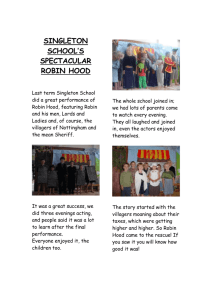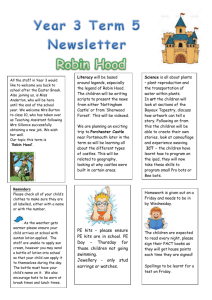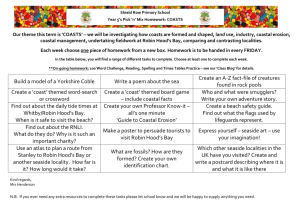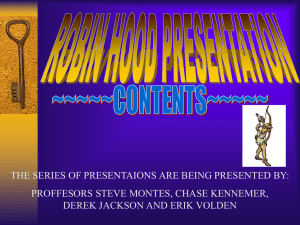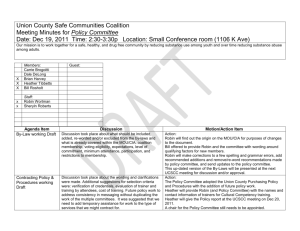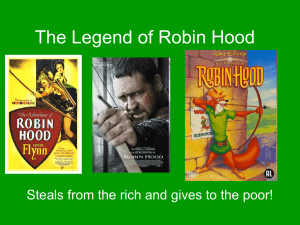Common Core Curriculum Maps – ELA 4th Grade: Unit 1 – Tales of
advertisement
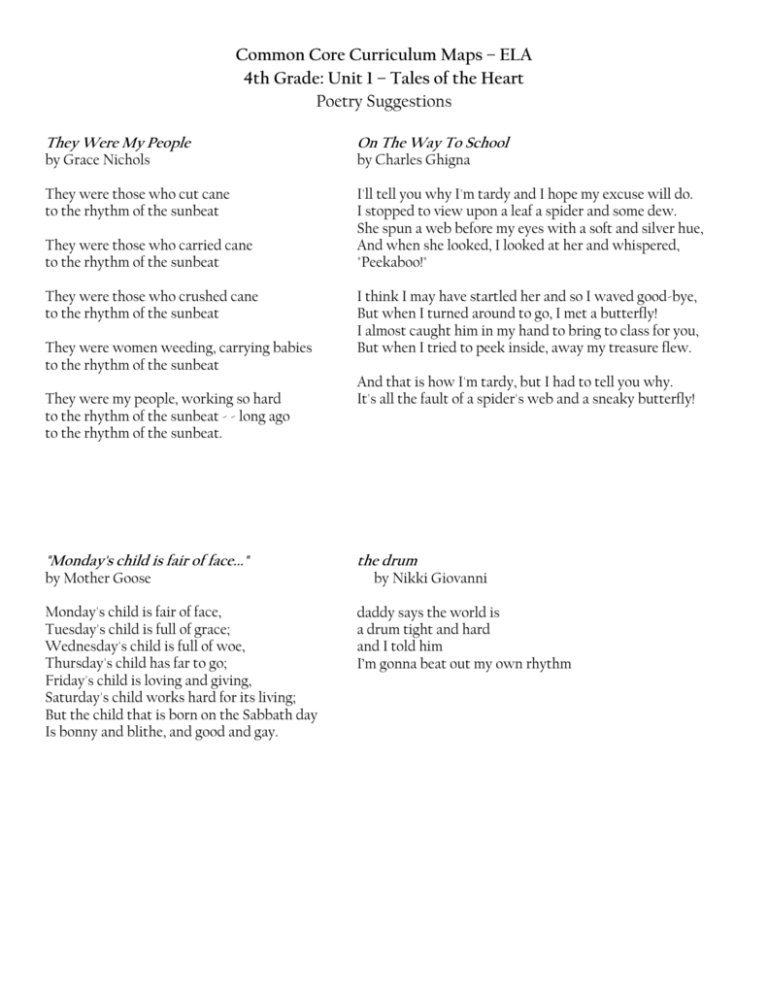
Common Core Curriculum Maps – ELA 4th Grade: Unit 1 – Tales of the Heart Poetry Suggestions They Were My People On The Way To School They were those who cut cane to the rhythm of the sunbeat I'll tell you why I'm tardy and I hope my excuse will do. I stopped to view upon a leaf a spider and some dew. She spun a web before my eyes with a soft and silver hue, And when she looked, I looked at her and whispered, "Peekaboo!" by Grace Nichols They were those who carried cane to the rhythm of the sunbeat They were those who crushed cane to the rhythm of the sunbeat They were women weeding, carrying babies to the rhythm of the sunbeat They were my people, working so hard to the rhythm of the sunbeat - - long ago to the rhythm of the sunbeat. "Monday's child is fair of face..." by Mother Goose Monday's child is fair of face, Tuesday's child is full of grace; Wednesday's child is full of woe, Thursday's child has far to go; Friday's child is loving and giving, Saturday's child works hard for its living; But the child that is born on the Sabbath day Is bonny and blithe, and good and gay. by Charles Ghigna I think I may have startled her and so I waved good-bye, But when I turned around to go, I met a butterfly! I almost caught him in my hand to bring to class for you, But when I tried to peek inside, away my treasure flew. And that is how I'm tardy, but I had to tell you why. It's all the fault of a spider's web and a sneaky butterfly! the drum by Nikki Giovanni daddy says the world is a drum tight and hard and I told him I’m gonna beat out my own rhythm Common Core Curriculum Maps – ELA 4th Grade: Unit 1 – Tales of the Heart Poetry Suggestions Humanity Dreams If I am blind and need someone To keep me safe from harm, It matters not the race to me Of the one who takes my arm. If I am saved from drowning As I grasp and grope, I will not stop to see the face Of the one who throws the rope. Or if out on some battlefield I’m falling faint and weak, The one who gently lifts me up May any language speak. We sip the water clear and cool, No matter the hand that gives it. A life that’s lived worthwhile and fine, What matters the one who lives it? Hold fast to dreams For if dreams die Life is a broken-winged bird That cannot fly. Hold fast to dreams For when dreams go Life is a barren field Frozen with snow. by Elma Stuckey by Langston Hughes Common Core Curriculum Maps – ELA 4th Grade: Unit 2 – Literature Settings: Weather or not Poetry Suggestions Dust of Snow by Robert Frost The way a crow Shook down on me The dust of snow From a hemlock tree Has given my heart A change of mood And saved some part Of a day I had rued. Fog by Carl Sandburg The fog comes on little cat feet. It sits looking over harbor and city on silent haunches and then moves on. Clouds by Christina Rossetti White sheep, white sheep, On a blue hill, When the wind stops, You all stand still. When the wind blows, You walk away slow. White sheep, white sheep, Where do you go? Common Core Curriculum Maps – ELA 4th Grade: Unit 3 – Animals Are Characters, Too: Characters Who Gallop, Bark, and Squeak Poetry Suggestions A Bird Came Down The Erratic Rat A bird came down the walk: He did not know I saw; He bit an angle-worm in halves And ate the fellow, raw. There was a ridiculous Rat Who was awfully puffy and fat. “I’ll carry,” he said, “This plate on my head, ‘Twill answer in place of a hat.” by Emily Dickinson And then he drank a dew From a convenient grass, And then hopped sidewise to the wall To let a beetle pass. He glanced with rapid eyes That hurried all abroad,-They looked like frightened beads, I thought; He stirred his velvet head Like one in danger; cautious, I offered him a crumb, And he unrolled his feathers And rowed him softer home Than oars divide the ocean, Too silver for a seam, Or butterflies, off banks of noon, Leap, splashless, as they swim. The Rhinoceros by Ogden Nash The rhino is a homely beast, For human eyes he's not a feast. Farwell, farewell, you old rhinoceros, I'll stare at something less prepoceros. Traditional limerick And then he remarked with a frown, “I suppose that I must have a gown; I’ll make me a kilt Of this old crazy-quilt, To wear when I’m going to town. “And of course, though the weather is warm, It may be there’ll come up a storm; An umbrella I’ll make Of a caraway cake, It’ll match with my whole uniform. "And I’ll carry a bottle of ink In case I should wish for a drink; And this flat-iron so sweet I’ll take with me to eat, And now I am ready, I think.” Common Core Curriculum Maps – ELA 4th Grade: Unit 4 – Revolutionaries from the Past Poetry Suggestions Concord Hymn George Washington By the rude bridge that arched the flood, Their flag to April’s breeze unfurled, Here once the embattled farmers stood And fired the shot heard round the world. Sing hey! for bold George Washington, That jolly British tar, King George’s famous admiral From Hull to Zanzibar! No – wait a minute – something’s wrong – George wished to sail the foam. But, when his mother thought, aghast, Of Georgie shinning up a mast, Her tears and protests flowed so fast That George remained at home. Sing ho! for grave Washington, The staid Virginia squire, Who farms his fields and hunts his hounds And aims at nothing higher! Stop, stop, it’s going wrong again! George liked to live on farms, But, when the Colonies agreed They could and should and would be freed, They called on George to do the deed And George cried Shoulder arms! Sing ha! for Emperor Washington, That hero of renown, Who freed his land from Britain’s rule To win a golden crown! No, no, that’s what George might have won But didn’t, for he said, There’s not much point about a king, They’re pretty but they’re apt to sting And, as for crowns – the heavy thing Would only hurt my head. by Ralph Waldo Emerson The foe long since in silence slept; Alike the conqueror silent sleeps; And Time the ruined bridge has swept Down the dark stream which seaward creeps. On this green bank, by this soft stream, We set today a votive stone; That memory may their deed redeem, When, like our sires, our sons are gone. Spirit, that made those heroes dare To die, and leave their children free, Bid Time and Nature gently spare The shaft we raise to them and thee. by Rosemary and Stephen Vincent Benet Common Core Curriculum Maps – ELA 4th Grade: Unit 4 – Revolutionaries from the Past Poetry Suggestions A Tragic Story A Nation’s Strength There lived a sage in days of yore, And he a handsome pigtail wore; But wondered much and sorrowed more, Because it hung behind him. What makes a nation’s pillars high And its foundations strong? What makes it mighty to defy The foes that round it throng? He mused upon this curious case, And swore he'd change the pigtail's place, And have it hanging at his face, Not dangling there behind him. It is not gold. Its kingdoms grand Go down in battle shock; Its shafts are laid on sinking sand, Not on abiding rock. Says he, "The mystery I've found Says he, "The mystery I've found! I'll turn me round," - he turned him round; But still it hung behind him. Is it the sword? Ask the red dust Of empires passed away; The blood has turned their stones to rust, Their glory to decay. Then round and round, and out and in, All day the puzzled sage did spin; In vain - it mattered not a pin The pigtail hung behind him. And is it pride? Ah, that bright crown Has seemed to nations sweet; But God has struck its luster down In ashes at his feet. And right and left and round about, And up and down and in and out He turned; but still the pigtail stout Hung steadily behind him. Not gold but only men can make A people great and strong; Men who for truth and honor’s sake Stand fast and suffer long. And though his efforts never slack, And though he twist and twirl, and tack, Alas! Still faithful to his back, The pigtail hangs behind him. Brave men who work while others sleep, Who dare while others fly... They build a nation’s pillars deep And lift them to the sky. by William Makepiece Thackeray Ralph Waldo Emerson Note: I could not locate the poem “The Flag” by unknown. It is not listed on the internet version of the CCC maps any longer. Since there is no author, it is difficult to ascertain the correct poem. Common Core Curriculum Maps – ELA 4th Grade: Unit 5 – Stories of the Earth and Sky Poetry Suggestions Indian Names by Lydia Howard Huntley Sigourney Ye say they all have passed away, That noble race and brave, That their light canoes have vanished From off the crested wave; That ’mid the forests where they roamed There rings no hunter shout, But their name is on your waters, Ye may not wash it out. ’Tis where Ontario’s billow Like Ocean’s surge is curled, Where strong Niagara’s thunders wake The echo of the world. Where red Missouri bringeth Rich tribute from the west, And Rappahannock sweetly sleeps On green Virginia’s breast. Ye say their cone-like cabins, That clustered o’er the vale, Have fled away like withered leaves Before the autumn gale, But their memory liveth on your hills, Their baptism on your shore, Your everlasting rivers speak Their dialect of yore. Old Massachusetts wears it, Within her lordly crown, And broad Ohio bears it, Amid his young renown; Connecticut hath wreathed it Where her quiet foliage waves, And bold Kentucky breathed it hoarse Through all her ancient caves. Wachuset hides its lingering voice Within his rocky heart, And Alleghany graves its tone Throughout his lofty chart; Monadnock on his forehead hoar Doth seal the sacred trust, Your mountains build their monument, Though ye destroy their dust. Ye call these red-browned brethren The insects of an hour, Crushed like the noteless worm amid The regions of their power; Ye drive them from their father’s lands, Ye break of faith the seal, But can ye from the court of Heaven Exclude their last appeal? Ye see their unresisting tribes, With toilsome step and slow, On through the trackless desert pass A caravan of woe; Think ye the Eternal’s ear is deaf? His sleepless vision dim? Think ye the soul’s blood may not cry From that far land to him? Common Core Curriculum Maps – ELA 4th Grade: Unit 6 – Literary Heroes Poetry Suggestions Why Dragons? by Jane Yolen The smoke still hangs heavily over the meadow, Circling down from the mouth of the cave, While kneeling in prayer, full armored and haloed, The lone knight is feeling uncertainly brave. The promise of victory sung in the churches, Is hardly a murmur out here in the air. All that he hears is the thud of this faint heart Echoing growls of the beast in its lair. The steel of his armor would flash in the sunlight, Except that the smoke has quite hidden the sky. The red of the cross on his breast should sustain him, Except - he suspects - it's a perfect bull's-eye. The folk of the village who bet on the outcome Have somehow all fled from the scene in dismay. They'll likely return in a fortnight or longer, He doubts that they'll be of much help on this day. And then - with a scream - the fell beast of the cavern Flings its foul body full out of the cave. The knight forgets prayers and churches and haloes And tries to remember just how to be brave. The webs on the wings of the dragon are reddened, With blood or with sunlight, the knight is not sure. The head of the beast is a silver-toothed nightmare, Its tongue drips a poison for which there's no cure. He thrusts his sword and he pokes with his gauntlets, He knees with his poleyn, kicks out with his greave. He'd happily give all the gold in his pocket If only the dragon would quietly leave. There's smoke and there's fire, there's wind and there's growling. There's screams from the knights, and his sobs and his cries. And when the smoke clears, there's the sound of dry heaving As one of the two of them messily dies. Of course it's the knight who has won this hard battle, Who wins in a poem beaten out on a forge Of human devising and human invention. BUT: If there's no dragon - then there's no Saint George. Common Core Curriculum Maps – ELA 4th Grade: Unit 6 – Literary Heroes Poetry Suggestion: Robin Hood and Little John, p. 1 Robin Hood and Little John Anonymous WHEN 1 Robin Hood was about twenty years old, With a hey down, down, and down; He happen’d to meet Little John, A jolly brisk blade, right fit for the trade, For he was a lusty young man. 5 Though he was call’d Little, his limbs they were large, And his stature was seven foot high; Wherever he came, they quak’d at his name, For soon he would make them to fly. ‘Thou talkst like a coward,’ the stranger reply’d; ‘Well arm’d with a long bow you stand, To shoot at my breast, while I, I protest, 40 Have nought but a staff in my hand.’ ‘The name of a coward,’ quoth Robin, ‘I scorn, Wherefore my long bow I’ll lay by, And now, for thy sake, a staff will I take, The truth of thy manhood to try.’ 45 How they came acquainted, I’ll tell you in brief, 10 If you would but listen awhile; For this very jest, amongst all the rest, I think it may cause you to smile. Then Robin Hood stept to a thicket of trees, And choose him a staff of ground oak; Now this being done, away he did run To the stranger, and merrily spoke: For Robin Hood said to his jolly bowmen, ‘Pray tarry you here in this grove; 15 And see that you all observe well my call, While thorough the forest I rove. ‘Lo! see my staff it is lusty and tough, 50 Now here on the bridge we will play; Whoever falls in, the other shall win, The battle, and so we’ll away.’ We have had no sport for these fourteen long days, Therefore now abroad will I go; Now should I be beat, and cannot retreat, 20 My horn I will presently blow.’ Then did he shake hands with his merry men all, And bid them at present good-by: Then, as near a brook his journey he took, A stranger he chanced to espy. 25 ‘With all my whole heart,’ the stranger reply’d, ‘I scorn in the least to give out;’ 55 This said, they fell to’t without more dispute, And their staffs they did flourish about. At first Robin he gave the stranger a bang, So hard that it made his bones ring: The stranger he said, ‘This must be repaid, I’ll give you as good as you bring. They happened to meet on a long narrow bridge, And neither of them would give way; Quoth bold Robin Hood, and sturdily stood, ‘I’ll shew you right Nottingham-play’. With that from his quiver an arrow he drew, A broad arrow with a goose-wing. The stranger reply’d, ‘I’ll liquor thy hide. If thou offerest to touch the string.’ Quoth bold Robin Hood, ‘Thou dost prate like an ass For were I to bend but my bow, 35 I could send a dart, quite thro’ thy proud heart, Before thou couldst strike me one blow.’ ‘So long as I am able to handle my staff, To die in your debt, friend, I scorn.’ Then to it each goes, and followed their blows, As if they’d been threshing of corn. 65 30 The stranger gave Robin a crack on the crown, Which caused the blood to appear; Then Robin, enraged, more fiercely engaged, And followed his blows more severe. 60 Common Core Curriculum Maps – ELA 4th Grade: Unit 6 – Literary Heroes Poetry Suggestion: Robin Hood and Little John, p.2 So thick and so fast did he lay it on him, With a passionate fury and ire; At every stroke, he made him to smoke, As if he had been all on fire. 70 O then into fury the stranger he grew, And gave him a damnable look, 75 And with it a blow, that laid him full low, And tumbled him into the brook. ‘I prithee, good fellow, where art thou now?’ The stranger, in laughter, he cried; Quoth bold Robin Hood, ‘Good faith, in the flood, 80 And floating along with the tide. ‘I needs must acknowledge thou art a brave soul, With thee I’ll no longer contend; For needs must I say, thou has got the day, Our battle shall be at an end.’ 85 Then unto the bank he did presently wade, And pulled himself out by a thorn; Which done, at the last, he blowed a loud blast Straightway on his fine bugle-horn: The echo of which through the valleys did fly, 90 At which his stout bowmen appeared, All clothed in green, most gay to be seen, So up to their master they steered. ‘O, what’s the matter?’ quoth William Stutely, ‘Good master you are wet to the skin.’ 95 ‘No matter,’ quoth he, ‘the lad which you see In fighting, hath tumbled me in.’ ‘He shall not go scot-free,’ the others reply’d, So straight they were seizing him there. To duck him likewise: but Robin Hood cries, 100 ‘He is a stout fellow, forbear. ‘There’s no one shall wrong thee, friend, be not afraid; These bowmen upon me do wait; There’s three score and nine; if thou wilt be mine, Thou shalt have my livery straight. 105 ‘And other accoutrements fit for a man; Speak up, jolly blade, never fear: I’ll teach you also the use of the bow, To shoot at the fat fallow-deer.’ ‘O, here is my hand,’ the stranger reply’d, ‘I’ll serve you with all my whole heart; My name is John Little, a man of good mettle; Ne’er doubt me, for I’ll play my part.’ 110 ‘His name shall be alter’d,’ quoth William Stutely, ‘And I will his godfather be: 115 Prepare then a feast, and none of the least, For we will be merry,’ quoth he. They presently fetched him a brace of fat does, With humming strong liquor likewise; They loved what was good; so, in the green wood, 120 This pretty sweet babe they baptize. He was, I must tell you, but seven foot high, And, may be, an ell in the waist; A pretty sweet lad; much feasting they had; Bold Robin the christening graced, 125 With all his bowmen, which stood in a ring, And were of the Nottingham breed; Brave Stutely comes then, with seven yeomen, And did in this manner proceed: ‘This infant was called John Little,’ quoth he; 130 ‘Which name shall be changed anon: The words we’ll transpose; so wherever he goes, His name shall be called Little John.’ They all with a shout made the elements ring; So soon as the office was o’er, 135 To feasting they went, with true merriment, And tippled strong liquor gillore. Then Robin he took the pretty sweet babe, And clothed him from top to the toe In garments of green, most gay to be seen, 140 And gave him a curious long bow. Common Core Curriculum Maps – ELA 4th Grade: Unit 6 – Literary Heroes Poetry Suggestion – Robin Hood and Little John, p. 3 ‘Thou shalt be an archer as well as the best, And range in the greenwood with us; Where we’ll not want gold nor silver, behold, While bishops have ought in their purse. 145 ‘We live here like ’squires, or lords of renown, Without e’er a foot of free land; We feast on good cheer, with wine, ale, and beer, And everything at our command.’ Then music and dancing did finish the day; At length, when the sun waxed low, Then all the whole train the grove did refrain, And unto their caves they did go. And so ever after, as long as he liv’d, Although he was proper and tall, 155 Yet, nevertheless, the truth to express, Still Little John they did him call. 150 Common Core Curriculum Maps – ELA 4th Grade: Unit 6 – Literary Heroes Poetry Suggestion – Robin Hood and Maid Marian, p. 1 Robin Hood and Maid Marian Edited by Stephen Knight and Thomas H. Ohlgren Originally Published in Robin Hood and Other Outlaw Tales. Kalamazoo, Michigan: Medieval Institute Publications, 1997 A bonny fine maid of a noble degree, With a hey down down a down down Maid Marian calld by name, Did live in the North, of excellent worth, For she was a gallant dame. For favour and face, and beauty most rare, Queen Hellen shee did excell; For Marian then was praisd of all men That did in the country dwell. 'Twas neither Rosamond nor Jane Shore, Whose beauty was clear and bright, That could surpass this country lass, Beloved of lord and knight. The Earl of Huntington, nobly born, That came of noble blood, To Marian went, with a good intent, By the name of Robin Hood. With kisses sweet their red lips meet, For shee and the earl did agree; In every place, they kindly imbrace, With love and sweet unity. But fortune bearing these lovers a spight, That soon they were forced to part; To the merry green wood then went Robin Hood, With a sad and sorrowfull heart. And Marian, poor soul, was troubled in mind, For the absence of her friend; With finger in eye, shee often did cry, And his person did much comend. Perplexed and vexed, and troubled in mind, Shee drest her self like a page, And ranged the wood to find Robin Hood, The bravest of men in that age. With quiver and bow, sword, buckler, and all, Thus armed was Marian most bold, Still wandering about to find Robin out, Whose person was better then gold. But Robin Hood, hee, himself had disguisd, And Marian was strangly attir'd, That they provd foes, and so fell to blowes, Whose vallour bold Robin admir'd. They drew out their swords, and to cutting they went, At least an hour or more, That the blood ran apace from bold Robins face, And Marian was wounded sore. "O hold thy hand, hold thy hand," said Robin Hood, "And thou shalt be one of my string, To range in the wood with bold Robin Hood, To hear the sweet nightingall sing." When Marian did hear the voice of her love, Her self shee did quickly discover, And with kisses sweet she did him greet, Like to a most loyall lover. When bold Robin Hood his Marian did see, Good lord, what clipping was there! With kind imbraces, and jobbing of faces, Providing of gallant cheer. For Little John took his bow in his hand, And wandring in the wood, To kill the deer, and make good chear, For Marian and Robin Hood. A stately banquet they had full soon, All in a shaded bower, Where venison sweet they had to eat, And were merry that present hour. Great flaggons of wine were set on the board, And merrily they drunk round Their boules of sack, to strengthen the back, Whilst their knees did touch the ground. First Robin Hood began a health To Marian his onely dear, Common Core Curriculum Maps – ELA 4th Grade: Unit 6 – Literary Heroes Poetry Suggestion – Robin Hood and Maid Marian, p. 2 And his yeomen all, both comly and tall, Did quickly bring up the rear. For in a brave veine they tost off the bouls, Whilst thus they did remain, And every cup, as they drunk up, They filled with speed again. At last they ended their merryment, And went to walk in the wood, Where Little John and Maid Marian Attended on bold Robin Hood. In sollid content together they livd, With all their yeomen gay; They livd by their hands, without any lands, And so they did many a day. But now to conclude, an end I will make In time, as I think it good, For the people that dwell in the North can tell Of Marian and bold Robin Hood.
